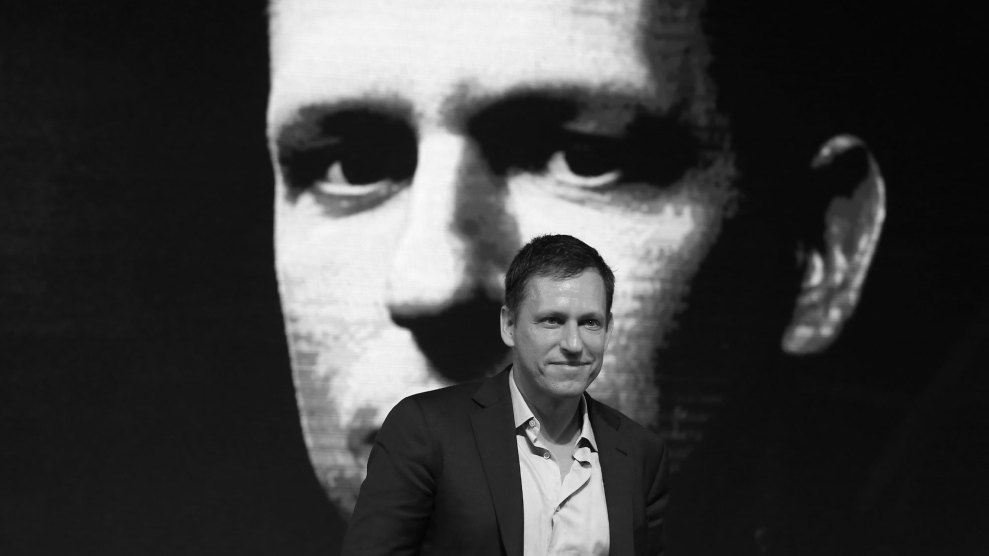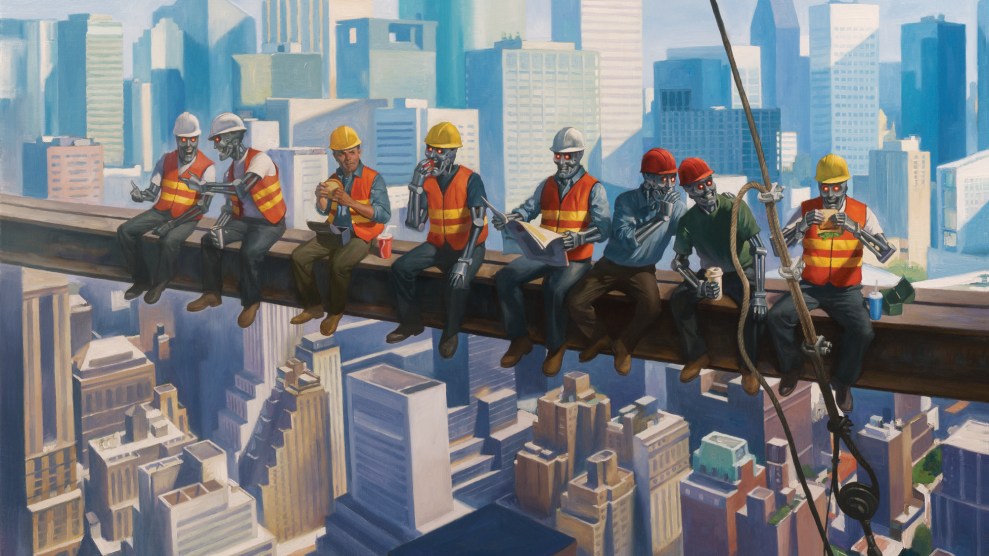When the US targeted Russia’s oligarchs after the invasion of Ukraine, the trail of assets kept leading to our own backyard. Not only had our nation become a haven for shady foreign money, but we were also incubating a familiar class of yacht-owning, industry-dominating, resource-extracting billionaires. In the January + February 2024 issue of our magazine, we investigate the rise of American Oligarchy—and what it means for the rest of us. You can read all the pieces here.
Silicon Valley is a physical place, but it’s also a style of thinking, a state of being, and an ethos. Its reach has extended far beyond its origins south of San Francisco, beyond even Austin and Seattle, where it has displaced anyone who dares utter words that aren’t from a VC investment thesis or pitch deck. The trillion-dollar-plus market caps of the biggest tech companies exceed the GDPs of all but the richest countries. The Valley’s companies are ensconced in every single part of our lives—art, culture, commerce, politics, wars, and communications all run through their devices and apps. What if, though, the truth is that we haven’t Silicon Valleyed hard enough?
Adherents of “effective accelerationism,” a trendy new phrase passing itself off as an ideology, think that’s the case. It’s a worldview that began with a few anonymous Twitter accounts back in 2022 and has since taken off, culminating in a 5,000-word October manifesto from Valley oligarch and venture capitalist Marc Andreessen that generated enough online discourse that New York Times columnist Ezra Klein felt compelled to rebut it in his first column after three months of book leave.
Fans of e/acc (pronounced “E-ack”) believe that speeding up profit-driven technological innovation is an inevitability—and a moral good. It’s a repudiation of effective altruism, the social movement backed by disgraced crypto mogul Sam Bankman-Fried that urges people to become ultrawealthy so they can use their fortunes for good. While effective altruists claim to be ultimately motivated by charitable giving, accelerationists unequivocally want every dollar of tech money plowed back into tech companies. “Giving money to charity is a waste as it is not a self-sustaining/growing organism like a corporation. Simply invest in inspiring startups instead,” wrote @BasedBeffJezos, one of the accounts that helped popularize e/acc. Jezos went on to praise Google co-founder Larry Page for having said he’d prefer to give money to Elon Musk or other founders “changing the world” than to philanthropic causes. Andreessen—whose a16z VC firm has invested in dozens of AI companies—argues that “technological innovation in a market system is inherently philanthropic.”
Underneath all this talk about philanthropy lurks e/acc’s chief concern: removing any and all impediments to the development of technology, especially artificial intelligence. In practice, its proponents see the general concept of “building” (i.e., starting any new tech company) as advancing human welfare. With profit guiding those decisions, they will aggregate to, as Jezos and a group of co-authors put it in a key text, “usher in the next evolution of consciousness creating unthinkable next-generation lifeforms and silicon-based awareness.”
It’s tempting to think of e/acc as a fringe online movement of shitposting anons. But e/acc taps deeply into the Californian Ideology—a version of “greed is good,” especially techno-utopian greed—that came out of the pages of the Whole Earth Catalog, suffused early issues of Wired, and now lives on in the Silicon Valley founders and venture capitalists who grew up reading them.
Like the Californian Ideology of the 1970s and ’80s, e/acc justifies and romanticizes getting rich in tech. But it is more insidious and brazen. And while its original proponents are fringe anon posters, e/acc is increasingly being adopted by rank-and-file techies and masters of the universe alike. Both extremely online VC Garry Tan and price-gouging pharma bro Martin Shkreli, for example, have added “e/acc” to their display names on Twitter (now known as X) as a badge of pride. Tan—president and CEO of the hallowed Y Combinator startup incubator that has invested in dozens of AI companies since the start of 2023—co-hosted an e/acc panel in September, where Jezos appeared onscreen as a buff, bare-chested avatar. (He had kept his identity secret until early December, when Forbes unmasked him as Guillaume Verdon, a former Google quantum computing engineer who founded a stealth AI hardware startup last year.) Andreessen has been hitting the podcast circuit to spread the gospel of e/acc as a “practical expression of how the world actually works” and a “defense of capitalism, of technology, of innovation, of productivity.”
The cleavage between e/acc and effective altruists is rumored to have also played a part in this month’s high profile ouster and reinstatement of Sam Altman as OpenAI CEO. Effective accelerationists and AI doomers alike both speculated that his removal was the result of being insufficiently committed to AI safety.
Yet for all of the e/acc talk about AI saving the world, the role of humans in the world it anticipates is left unresolved. Adherents acknowledge that humanity is here now and has agency, but in the long run they’re not committed to, well, people. It’s almost as if e/acc’s boosters are less concerned about either a coherent intellectual framework or the fate of humanity than they are with creating a moral justification for getting ridiculously rich.

It’s tricky to pin down the specifics of e/acc because it isn’t a formal intellectual movement, but rather some guys whipping up a canon that is effectively a collection of exceedingly confident tweets, group chats, and Substack posts. The project is based on two barely compatible premises: first, that the physical world is endowed with an inevitable tendency toward growth, and second, that generating more intelligences and consciousnesses is unequivocally good.
The first premise, that unbridled growth is always a boon, rests on little more than the obvious observation that growth is natural. From this, adherents argue that pursuing e/acc is just submitting to the “thermodynamic will of the universe.” This logic falls prey to what’s known in philosophy as the naturalistic fallacy, conflating what is and what ought to be. If you believe in giving up moral discernment in favor of natural determinism, there is no way to reject disgusting behavior to which people are biologically disposed.
The second premise, that we need to invent new forms of consciousness in order to build a better world, ignores that a better world is within reach via tools we already have. Child and maternal mortality, declining life expectancy, transit snarls, homelessness, social inequality, and many other problems already have solutions that have been successfully implemented. If lawmakers, donors, and voters won’t fund such measures now, they’re not going to change their minds after a machine tells them to. And while e/acc adherents argue that technological innovations will provide resources that render these problems irrelevant, history offers little hope such bounty would be fairly distributed.
The people drawn to e/acc like it because it doesn’t prescribe any actions or metrics for achieving a better world. It is outcome-neutral; whatever future our tech overlords have in store for us is the right one. But despite e/acc’s intellectual hollowness, its forerunners do include academics, first among them Nick Land, a key member of the influential Cybernetic Culture Research Unit, a group based at the University of Warwick in the 1990s whose penumbra also included the novelist Hari Kunzru, dubstep pioneer Kode9, and prominent left theorist and writer Mark Fisher, who died in 2017. Land’s writings are wide-ranging and extremely dense, focusing on capitalism accelerating the world toward eventual destruction—a future he welcomed. After leaving the CCRU at the end of the ’90s, Land’s work took an explicit right-wing turn against democracy and towards concepts that include a form of eugenics that he called “hyper-racism.” His more recent writings have influenced right-wing accelerationists as well as neo-reactionary thinkers like the tech founder Curtis Yarvin, a Peter Thiel–affiliated monarchist who has expressed support for authoritarian and racist ideas.
Land’s influence on e/acc matters not just because it reveals its far-right antecedent, but because, depending on how you interpret his writing, Land is, at best, unconcerned with humanity; at worst, he despises it and cheers its demise. The philosopher Maya B. Kronic, who crossed paths with Land at Warwick, described his ideology as one that considers human-centric perspectives as constraining to the future machine intelligences. “With its invocation of apocalyptic planetary techno-singularity,” Kronic wrote in 2012 while describing an essay by Land, “its dark anticipative delight [is] a nihilistic riposte to the ascendant Californian cyber-optimism of Wired.” If the human race were cast aside to create AIs, then that would simply fulfill what Land saw as humanity’s inherent and inevitable death drive.
Land’s fingerprints are all over e/acc, but the original framers of effective accelerationism have avoided copping to this, likely because of his toxic reputation. Andreessen’s “Techno-Optimist Manifesto” from October 2023, though, let the veil slip, not only citing Land’s conceptualization of a “techno-capital machine…of perpetual material creation, growth, and abundance,” but also by naming Land as one of his intellectual “patron saints.” Notably, even though he has acknowledged that his approval risks “cursing” the movement, Land has expressed support, simply tweeting in August, “I like e/acc.”
People familiar with Land’s work often conclude that e/acc is just his accelerationist vision repackaged. “Nick Land diluted for LinkedIn” is how Thomas Murphy, a software engineer and writer, has put it. Others see e/acc as mostly talk, which, beyond serving as a moral justification for rapacious profit-seeking, provides a professional function. By putting e/acc in your display name, you can signal to potential bosses and investors that you are vaguely transgressive and that you, too, get it. It’s another version of the branding game familiar to Silicon Valley: Assert it is the hub of American innovation while profiting from innovations—the internet, GPS, email—first produced by government investment.
“A lot of tech people are into philosophical concepts almost as toys,” says Maxwell Foley, a contributor to Harmless AI, a group Substack that treads a middle ground between e/acc’s blind AI boosterism and those who worry AI will doom our species. Foley, who asked to be described as a “community ambassador for the emerging ‘corporate surrealist’ movement,” explains that e/acc believers “gravitate to anything that’s interesting. They don’t seek to actually reconcile techno-capital ambitions into an ethical framework to guide their actions.” Silicon Valleyites have previously appropriated versions of rationalism and Stoicism to justify their perspectives and life paths. E/acc, Foley says, is merely the latest iteration, a “way for techies to network by appropriating Nick Land’s anti-human philosophy, burying the part where it says, ‘We all fucking die.’”
Silicon Valley being down for the potential extinction of humanity sounds patently absurd, but in Walter Isaacson’s recent biography of Elon Musk, he describes a 2013 debate between Musk and Larry Page. Without guardrails, Musk argued, AI might render human beings irrelevant—or extinct. Page’s response, according to Isaacson, was that this didn’t matter. It would just be the next stage of evolution, Page said, before calling Musk a “specist”—meaning he thought too highly of the human race. Harmless AI has alleged that others in tech are privately okay with the possibility of AI bringing on human extinction; indeed, Beff Jezos has praised Page as possibly “the most e/acc-aligned tech founder.”
Silicon Valley has long ridden high on its own supply, seeing itself as the only place where you could be at an epicenter of societal progress while also getting ridiculously rich. But today that illusion has come crashing down. Brookings Institution polling has found that while Americans historically have widely trusted major tech companies, between 2018 and 2021, the public lost more confidence in Amazon, Facebook, and Google than in any other major American institution. In recent years, both Republicans and Democrats have become frustrated with Silicon Valley, vowing to regulate it; President Joe Biden even tapped tech and antitrust critic Lina Khan to chair the Federal Trade Commission, where she seemed to usher in a new era by suing Amazon.
During last March’s implosion of Silicon Valley Bank, executives and investors reacted with surprise when everyday people were rooting for its collapse and watching, popcorn in hand, as the tech lords suffered. The schadenfreude of last summer’s Burning Man disaster was surely driven by the number of Y Combinator alumni whose RVs got stuck in the mud.
If e/acc is an attempt to rebrand tech zealotry as an apotheosis of moral goodness, it is also, as Silicon Valley grieves the realization that it is no longer seen as an unbridled force for good, a form of denial and bargaining—one last plea for salvation as the walls close in. If it happens to result in the end of humanity, so be it. As Land’s late CCRU contemporary and intellectual adversary Fisher famously said, “It’s easier to imagine the end of the world than the end of capitalism.”
To e/acc and its patron saint Land, both are inevitable. Maybe that’s the whole point: In a world without human beings, there will be no one left to complain about Silicon Valley.

















